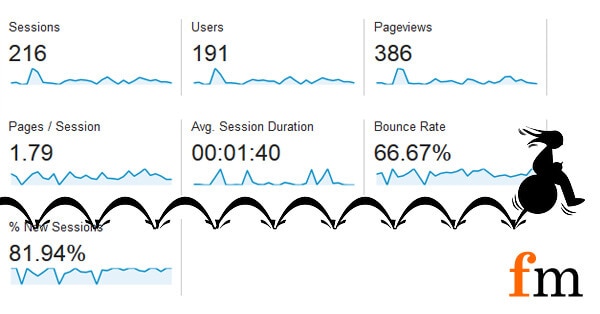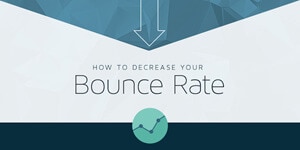One of the first questions I’m asked when a client receives their first Google Analytics report from us is “What’s Bounce Rate?” and “do we need to get it higher?”
As well as setting up our client’s with Google Analytics on their new websites, we also set them up with a customised Dashboard to make it easier for them to spot the important bits. Then we set it up so it is emailed to them weekly. This helpfulness on our part does tend to make life a bit busier – more questions and the knowledge that the performance of their new site is being actively monitored – but we want our clients to get the most from their sites.
One of the metrics measured is Bounce Rate and it’s one that can be very useful but sometimes very deceptive.
What is Bounce Rate?
The bounce rate is the percentage of visitors who visit your site but don’t look at any other pages on your site before leaving.
A high bounce rate can indicate some of the following problems:
- a badly designed site that is hard to navigate
- a site that just doesn’t look good or interesting
- a page that is showing up in searches but for something other than it is actually about
- poorly chosen keywords if your using ads to get extra visitors
- buying traffic – you know those emails you get about how you could get 300 visitors a day? They will all be wearing springs on their shoes because they really don’t care about your site, just getting paid to click
So a high Bounce Rate is bad?
For most “normal” websites, it’s not great. But there can be exceptions.
For example, if you’ve set up specific landing pages to get information from people, such as email addresses, then as long as your visitors are giving that information, getting them to hang around may not be your priority.
If you’re a frequent blogger, writing good quality articles and sharing them across the social networks, you can actually see your bounce rate increase. People will become regular visitors and only stop by to read your latest post. But that’s ok, just make sure you have some good “calls to action” to convert more of those regulars.
How can I reduce my Bounce Rate?
- Make sure your website is easy to navigate and easy to read
- Ensure each page / post has good quality, relevant content
- Edit your meta descriptions to make sure your visitors know what they are going to find (also helps you rank more accurately on Google!)
- Never be tempted to buy traffic – yes, thousands of hits on your site looks impressive but it won’t help your bottom line and won’t impress Google
- Finally, have a look at this great infographic from Quicksprout for more ideas.
Oh, and of course, we can help with numbers 1-3 and find better ways for you to spend money than on 4 – just contact us to find out how!





